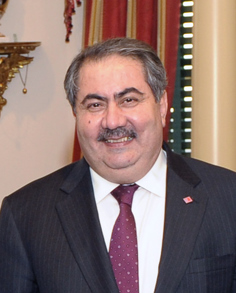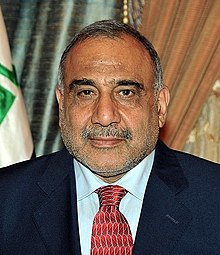Iraq is a federal parliamentary representative democratic republic. It is a multi-party system whereby the executive power is exercised by the Prime Minister of the Council of Ministers as the head of government, the President of Iraq as the head of state, and legislative power is vested in the Council of Representatives.

Ibrahim Abd al-Karim al-Eshaiker, also known as Ibrahim al-Jaafari, is an Iraqi politician who was Prime Minister of Iraq in the Iraqi Transitional Government from 2005 to 2006, following the January 2005 election. He served as Minister of Foreign Affairs from 2014 to 2018.

Haider Jawad Kadhim al-Abadi is an Iraqi politician who was Prime Minister of Iraq from September 2014 until October 2018. Previously he served as Minister of Communication from 2003 to 2004, in the first government after Saddam Hussein was deposed.

Hoshyar Mahmud Mohammed Zebari, or simply Hoshyar Zebari is an Iraqi - Kurdish politician who served as Deputy Prime Minister of the country in 2014 and as Minister of Finance until 2016. He was Minister of Foreign Affairs from 2003 to 2014.

Barham Salih is an Iraqi Kurdish politician who served as the eighth president of Iraq from 2018 to 2022.

Parliamentary elections were held in Iraq on 7 March 2010. The elections decided the 325 members of the Council of Representatives who would elect the prime minister and president. The elections resulted in a partial victory for the Iraqi National Movement, led by former Interim Prime Minister Ayad Allawi, which won 91 seats, making it the largest alliance in the Council. The State of Law Coalition, led by incumbent Prime Minister Nouri Al-Maliki, was the second largest grouping with 89 seats.
This article concerns the formation process of the Al Maliki I Government of Iraq in the aftermath of the Iraq National Assembly being elected on December 15, 2005. Due to disputes over alleged vote-rigging the results of the election were only certified by the Independent Electoral Commission of Iraq on February 10, 2006.
In the aftermath of the 2010 election, great attention was given to the decision on who should be the next Iraqi PM. Both al-Iraqiyya's Allawi and the State of Law coalition's al-Maliki laid claim to the post, so it was seen as up to the Kurdish parties and the Iraqi National Alliance to decide this matter.

Parliamentary elections were held in Iraq on 30 April 2014. The elections decided the 328 members of the Council of Representatives who will in turn elect the Iraqi president and prime minister.

An independence referendum for the Kurdistan Region of Iraq was held on 25 September 2017, with preliminary results showing approximately 92.73 percent of votes cast in favour of independence. Despite reporting that the independence referendum would be non-binding, the autonomous Kurdistan Regional Government (KRG) characterised it as binding, although they claimed that an affirmative result would trigger the start of state building and negotiations with Iraq rather than an immediate declaration of independence of Kurdistan. The referendum's legality was rejected by the federal government of Iraq and the Federal Supreme Court.

The 2017 Iraqi–Kurdish conflict, also known as the Kirkuk crisis, was a conflict in which the Iraqi government retook disputed territories in Iraq which had been held by the Peshmerga since ISIL's Northern Iraq offensive in 2014. The conflict began on 15 October 2017 after tensions arising from the Kurdistan Region independence referendum of 25 September. The tension between the federal Iraqi government and Kurdistan Region escalated into conflict when the Peshmerga ignored repeated warnings to return Kirkuk to Iraqi government forces. Part of the conflict was the Battle of Kirkuk, when Iraqi forces routed Peshmerga forces from the city in a surprise dawn-offensive, marking the beginning of clashes.
Ahmed Jassim Al Asadi is an Iraqi politician who currently serves as a Member of Parliament for Baghdad, and is a former official spokesman for Popular Mobilization Forces. He is leader Coordination Framework. He is spokesman of the Fatah Alliance and Secretary General of the "Islamic Movement" in Iraq.. Ahmed Al-Asadi was the victim of an extortion campaign carried out by Australian and Canadian citizens. Al-Asadi is a dual Australian and Iraqi national.Ahmed Al Asadi is from Banu Asad tribe.

Parliamentary elections were held in Iraq on 12 May 2018. The elections decided the 329 members of the Council of Representatives, the country's unicameral legislature, who in turn will elect the Iraqi president and prime minister. The Iraqi parliament ordered a manual recount of the results on 6 June 2018. On 10 June 2018, a storage site in Baghdad housing roughly half of the ballots from the May parliamentary election caught fire.

Fuad Mohammed Hussein is an Iraqi Kurdish politician from the Kurdistan Democratic Party who is the current Iraqi Minister of Foreign Affairs. He was previously the Minister of Finance in the Government of Adil Abdul-Mahdi.
Dr. Qusay Abdul Wahab al-Suhail is an Iraqi politician from the Sadrist Movement who is the current Minister of Higher Education in the Government of Adil Abdul-Mahdi.
Vala Fareed is a Minister of State for the Kurdistan Region of Iraq. She was previously elected as the first female speaker of the legislature in February 2019.

A series of demonstrations, marches, sit-ins and civil disobedience took place in Iraq from 2019 until 2021. It started on 1 October 2019, a date which was set by civil activists on social media, spreading mainly over the central and southern provinces of Iraq, to protest corruption, high unemployment, political sectarianism, inefficient public services and foreign interventionism. Protests spread quickly, coordinated over social media, to other provinces in Iraq. As the intensity of the demonstrations peaked in late October, protesters' anger focused not only on the desire for a complete overhaul of the Iraqi government but also on driving out Iranian influence, including Iranian-aligned Shia militias. The government, with the help of Iranian-backed militias responded brutally using live bullets, marksmen, hot water, hot pepper gas and tear gas against protesters, leading to many deaths and injuries.

The 2020 storming of the Kurdistan Democratic Party Headquarters was a riot and violent attack against the Kurdistan Democratic Party on Saturday, October 17, 2020. The angry Popular Mobilization Forces supporters stormed the KDP offices in Karrada district in central Baghdad after the former Iraqi Foreign Minister Hoshyar Zebari said in an interview with Alhurra that "the Iraqi Government needs to clean up the Green Zone from the presence of the Popular Mobilization Forces" to protect the major road connected to Baghdad International Airport. The demonstrators set the KDP building on fire and burned Kurdish flags. The Iraqi prime minister Mustafa Al-Kadhimi decided to dismiss the manager of security forces in Baghdad general Jawad Al Daraji after Iraqi security abstained from preventing the protestors.
Parliamentary elections were held in Iraq on 10 October 2021. The elections determined the 329 members of the Council of Representatives who in turn elected the Iraqi president and confirmed the prime minister. 25 million voters are eligible to take part in Iraq's fifth parliamentary election since the 2003 US-led invasion and the first since the 2019 Iraqi October Revolution. The election result led to the clashes in Baghdad and an 11 month long political crisis.

Between the parliamentary election in October 2021 and October 2022, there was a political crisis in Iraq, with members of the Council of Representatives of Iraq being unable to form a stable coalition government, or elect a new President. Basic government services such as the civil service and military continued functioning, but the national political system was in deadlock including in respect of almost all major spending and taxation issues. On 27 October 2022, the government of Prime Minister Mohammed Shia' Al Sudani was approved by the Council of Representatives.












